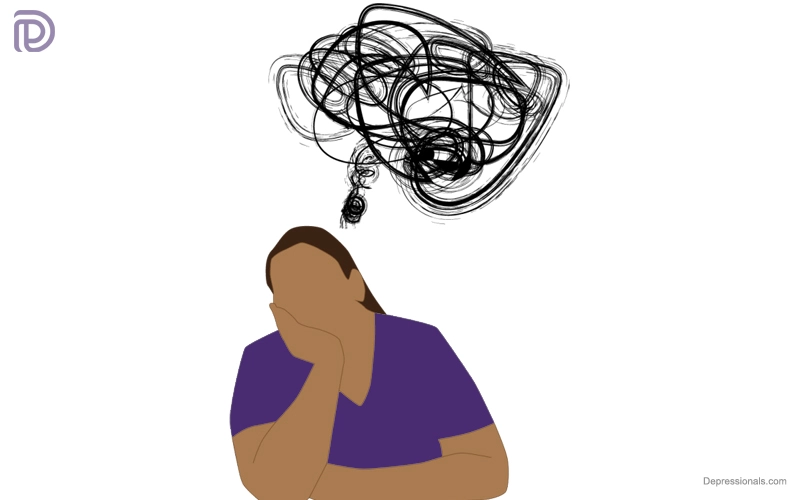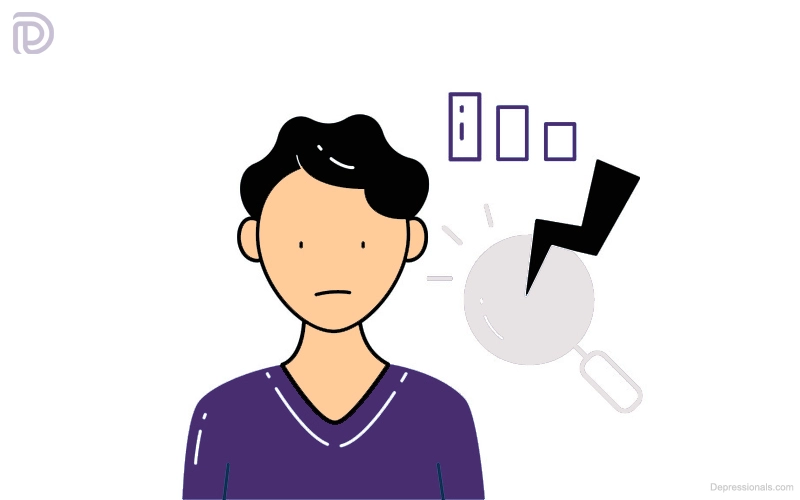It’s human nature to worry from time to time, but what is overthinking?
Overthinking is simply thinking too much, as its name implies. When we overthink, we spend endless time analyzing even the simplest situations or events, taking them out of their proper context in order to make them as simple as possible. Overthinking leads to feelings of stress and anxiety since the brain cannot translate thoughts into positive outcomes.
It’s not uncommon these days for people to use the phrase “overthinking”. The words “I’m overthinking my holiday packing” (you can imagine the social media posts) may seem superficial and lighthearted but to the genuine overthinker, these are not shallow or lighthearted thoughts. What is the difference between overthinking and merely thinking?
Read: How to Stop Overthinking
How do you define overthinking?
When you spend a lot of time overthinking – also known as rumination – you become obstructive to your life. Worrying about the future or ruminating about the past are two common types of overthinking.
It’s possible that overthinking makes you feel stuck or that you’re unable to take any action at all if you’re struggling with it. It can be difficult to concentrate on anything else when your mind is filled with thoughts. It is even possible to make things worse by overthinking.
An experienced therapist in Waltham, Massachusetts, Jessica Foley, believes that overthinking is unproductive. “You might lose sleep or miss a deadline when you ruminate on a decision for hours.”
A person who overthinks does not mean they are stressed or worried about a particular situation. Stressful situations can lead you to make decisions in the short term when you have a lot of thoughts about them. It is stress that can help you rise to the occasion, for instance, if you are nervous about an important work presentation. On the day of the project, you’ll work hard and leave early.
It’s not all bad to overthink. The problem arises when it interferes with your daily life and wellbeing and prevents you from taking action.
Two forms of overthinking
Ruminating and worrying are the two forms of overthinking. It’s different from problem-solving. Thinking about a solution is part of problem-solving. In overthinking, the problem is dwelled on indefinitely.
Self-reflection is also distinct from overthinking. Self-reflection can help you gain a fresh perspective on a situation or about yourself. This is a purposeful act. When you overthink, you dwell on your bad emotions and think about all the things you cannot change. New insights cannot be gained from it.
Self-reflection is not the same thing as overthinking, and neither is problem-solving. You can learn from your behavior or develop creative solutions if you spend time developing them. However, using your time for overthinking, whether for ten minutes or ten hours, is not beneficial.
Am I over-thinking?
Isn’t overthinking a part of everyone’s everyday life? It’s not just about protecting your loved ones, but also about doing a good job as parents, sons, daughters, employees and business people.
Most overthinkers are “ruminators”, remembering previously occurring events. Worrying about the future tends to be plain old and familiar: will I make the deadline? Is it possible to find my mother a nice residential apartment? When we worry, we are working on ways to mitigate the effects, but when we overthink, we become passive rather than active, dwelling on past events and building up disproportionately negative future outcomes.
Consider this scenario. Your new boss accidentally calls you by the wrong name. When you realize this later, how do you feel?
It’s fairly common for worriers to feel mildly embarrassed, apologize the next day via some self-deprecating words, and then completely forget about it by dinnertime. While they rewrite different outcomes, the overthinker repeatedly replays this error. It is not unusual for this individual to be mentally writing scenarios of being snubbed for promotions or redundancy by four in the morning. In an overthinking mind, the incident has triggered big questions that ultimately blow the entire incident out of proportion.
Over-thinking may seem like an insignificant example, but it’s a good illustration of how it can consume your mind and life. Excessive overthinking can lead to catastrophic predictions based on the outcomes of past events.
Related: Learn Causes of Overthinking
You overthink because of your primitive emotional brain
Overthinking has its roots in our primitive survival instinct, as do much other anxiety and depression traits.
Primitive minds always look at the world from the most negative point of view. The reason for this is that the brain is constantly alert, attempting to keep us alive – that saber-toothed tiger I mentioned earlier is no longer of any use.
Intellectually, we know that it will not be possible for us to lose our job due to the misidentification of our boss. People who ruminate may display primitive survival instincts, such as fighting or fleeing, thus keeping them alive by focusing on the worst-case scenarios. Anxiety and overthinking work together to increase feelings of stress and helplessness.
Read: Rumination Disorder
Signs you’re an overthinker

You can change your tendency to overthink things when you become more aware. You must first recognize that overthinking harms you more than it helps.
Overthinking can sometimes make people believe that they prevent bad things from happening. The problem is they believe that if they don’t worry enough or dwell too much on the past, they’ll find themselves in more trouble. However, the research indicates that overthinking is not good for you. It also does not help prevent problems or solve them.
You might be an overthinker if you exhibit the following 10 signs:
- My mind replays embarrassing moments over and over again.
- Sleeping is difficult for me because my brain won’t shut off.
- My mind often wonders, “what if…”.
- People say and events happen to me all the time and I’m constantly interested in the hidden meaning.
- In my mind, I replay our conversations and think of everything I regret or wish I would have said.
- My mistakes keep coming back to me.
- My mind replays a bad act or statement someone says to me all the time.
- When I dwell on the past or worry about the future, I sometimes miss what’s going on around me.
- Many of my worries are caused by things I have no control over.
- My mind is occupied with worries.
Read: Thought Disorder
What happens when you overthink?
An overly concerned or uneasy mood is caused by worrying about a situation or problem. Overthinking exacerbates symptoms of depression as your mind and body go into overdrive as you constantly worry about “what might happen.”
During the waking hours, high anxiety – perhaps even panic – can result from overthinking. Chronic worry often feel an ever-increasing sense of impending doom or worry about unrealistic things, which only increases their worries. Overworriers are hypersensitive both to their environment and to criticisms from others. They may consider everything and everyone as potential threats.
Your daily life can be affected by overthinking to such an extent that you may experience difficulty focusing on your job, eating, or sleeping. Worried people often turn to harmful lifestyle habits for relief, such as overeating, smoking cigarettes, and drinking alcohol and drugs.
Why is overthinking a bad thing?
Research shows overthinking can have a detrimental effect on your general well-being in addition to being a hassle. Overthinking can harm you in the following ways:
Triggers mental illness
Are you always dwelling on the mistakes you made in the past? Your chances of experiencing mental health problems increase if you dwell on your mistakes, problems, and shortcomings. If you overthink something, you can quickly get sucked into a vicious circle. It undermines your mental peace, which induces you to overthink as a result.
Affects the ability to solve problems
Are you overly analytical? It is believed that overthinkers help them overcome their situations or problems by rehashing them in their heads. However, studies show that this is not the case. Experiencing excessive overanalysis hinders a person’s ability to solve problems since this causes him to dwell and imagine scenarios that may never happen, instead of finding a solution to the problem.
If you are an overthinker, making simple decisions can feel like you are making a decision that will affect your life or death. It’s ironic that overanalyzing won’t lead to better decisions!
Related: Types of Overthinking
Disrupts your sleep
Sleep problems are likely to occur if you are an overthinker. Sleep is impossible when your mind is not at ease, since your body cannot tolerate this. Sleep is reduced when we worry about things we can’t control and ruminate incessantly about almost everything. This results in poor quality sleep and irritability the following day.
Let’s start thinking about overthinking – together
Overthinking medications
Following are the steps I use when I meditate:
- Relax in a quiet room by lying on your back or sitting in a chair
- You can take a full, controlled breath, of four seconds in followed by six seconds out
- Count your breaths ten times
- When you have taken ten breaths, keep repeating the procedure for at least ten minutes
Other medications
- Keep your mind on the present moment.
- Be optimistic
- Accept that you can’t control everything
- Distract yourself from troubled thoughts by choosing a hobby or an exercise routine
- Be grateful
- Be kind to yourself
Additionally, I recommend you exercise as little as 20 minutes a day. You will likely feel less stressed especially with aerobic activities like running and cycling.
Recommended: Multiple Strategies To Control Overthinking
How solution focused hypnotherapy can prevent overthinking
Occasionally, everyone overthinks. The problem arises when people find it difficult to stop thinking. Overthinkers intellectualize their worries, but real ruminators are bombarded with negative thoughts constantly. There is a strong likelihood of a vicious circle developing, as increased anxiety increases overthinking, and so on.
The only way to end this cycle is to break it. Overthinking can be handled with solution-focused hypnotherapy, which focuses on the present and on the future. We can replace all these negative thoughts with positive ones by creating a trance state that causes two sides of the brain to come together.
You will learn to identify your strengths and resources, and we will help you set goals and determine how to proceed based on those resources. A positive mental attitude and realistic perspective result from hypnosis, which helps people reduce anxiety through relaxation and visualization.
Did you accidentally call that new boss by the wrong name? I think it’s an opportunity for an informal chat, which is always nice, isn’t it?
Read: How to Overcome Analysis Paralysis
You aren’t alone. we can help you overcome overthinking, which is something many people experience.
By using solution-focused hypnotherapy, it is easy to break overthinking and anxiety. There is no better way to begin managing your thoughts again than this natural, calming method.






I was studying some of your posts on this internet site and I think this website is very informative! Keep on putting up.
Real fantastic info can be found on web site. “The only thing you take with you when you’re gone is what you leave behind.” by John Allston.
Asperger syndrome is often referred to as a less severe type of autism which may be linked with overthinking though.